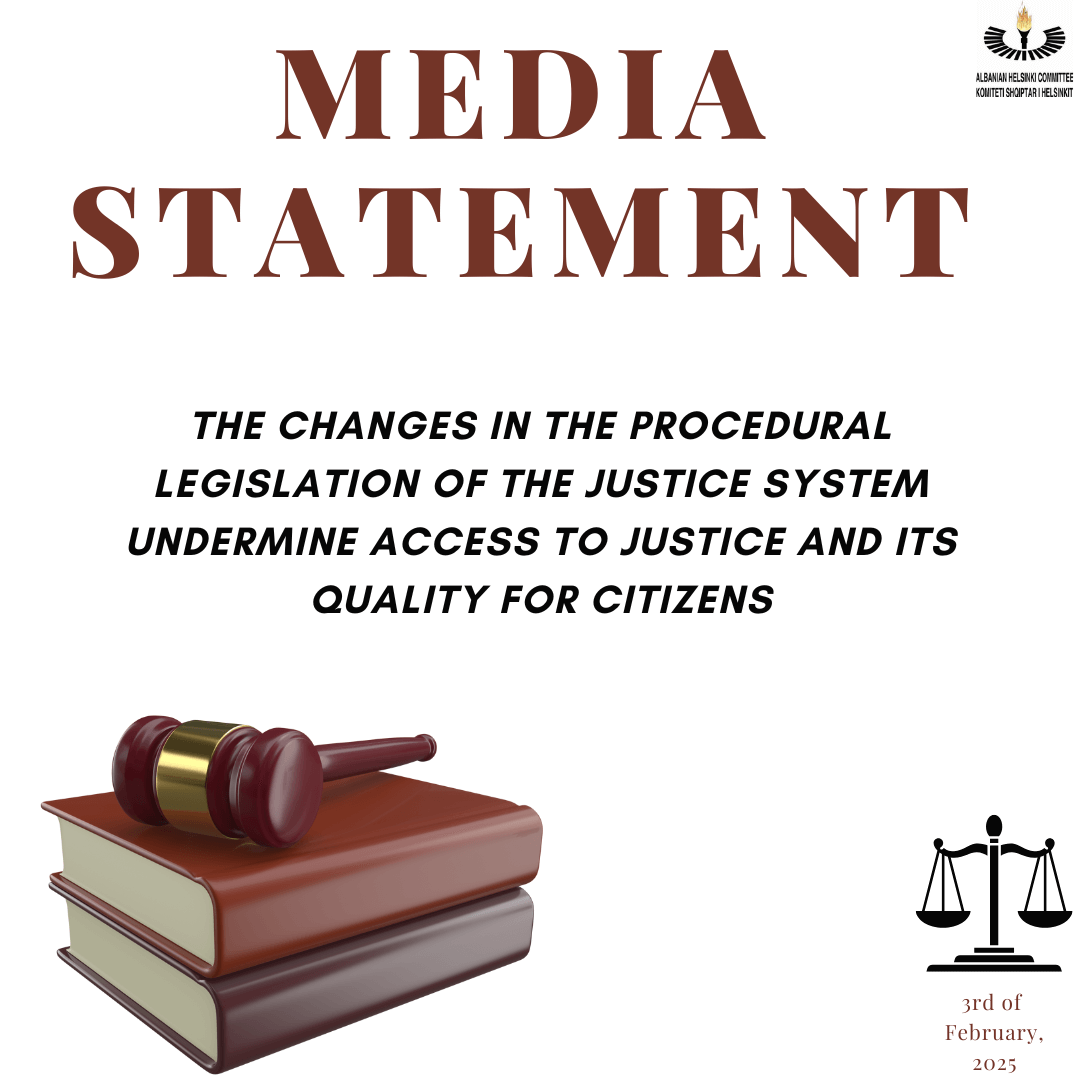Tirana, February 3, 2025
PRESS STATEMENT
Amendments to procedural legislation in the justice system infringe upon access to justice and the quality of justice for citizens
By means of the Assembly’s Public Consultation platform, the Albanian Helsinki Committee became familiar with three draft laws, which are of importance for the activity and mission of our organization, in protection of the principles of the rule of law as well as human rights and freedoms. These were namely:
- Draft law “On some additions and amendments to law no. 7905, dated 21.04.1995 “Criminal Procedure Code of the Republic of Albania,” amended.
- Draft law “On some additions and amendments to law no. 8116, dated 29.03.1996, “Civil Procedure Code of the Republic of Albania,” amended.
- Draft law “On some additions and amendments on law no. 49/2012 “On administrative courts and the adjudication of administrative disputes,” amended.
Through a legal critique, AHC addressed the Assembly of the Republic of Albania as it identified and analyzed some issues of a constitutional nature. AHC’s critique focuses mainly on specific constitutional principles, such as the principle of juridical certainty and legitimate expectations according to article 4 of the Constitution, the principle of effective appeal to a higher instance of court according to article 43 of the Constitution, the principle of the quality of judicial decision-making as a whole of the elements of due legal process, just as much as of the administration of justice, according to article 42 of the Constitution, the principle of proportionality in interventions to restrict fundamental human rights according to article 17 of the Constitution.
The most important legal proposals that AHC opposes are the following ones:
- We oppose the reduction of the number of judges in panels of judges both in criminal cases and in civil cases, because:
- Panels of judges, discussions, different stances, minorities, and parallels inside a panel of judges give value to quality decision-making and are one more guarantee for the individual and the potential decision in his favor or disfavor.
- The panel of three judges, where potentially there is room for differing stances in the judicial decision, increases both the opportunity and quality for its further effective control in case of recourse in the High Court and of a constitutional appeal at the Constitutional Court, based on the constitutional principle of interaction between courts and the principle of subsidiarity.
- Legal amendments to the Criminal Procedure Code provide adjudication at the appeals level with one compared to three judges that the panel of judges consisted of in the past for material criminal adjudications on guilt or lack thereof, a change that may weaken the quality of adjudication for a series of criminal cases for criminal offenses where envisaged punishment varies from a fine up to two years of imprisonment.
It is worth emphasizing that in May 2021, amendments were offered and went into effect in the panels of judges for different cases, to the extent they were deemed reasonable, at the first instance, appeals, and the High Court, through law no. 41/2021, which amended the Civil Procedure Code and law no. 44/2021, which amended the Civil Procedure Code. Frequent legislative amendments, within very short windows of time for procedural laws that require a qualified majority, in the context of issues that have appeared with regard to judicial efficiency as a result of the reduction of the number of judges/prosecutors, are creating, in AHC’s assessment, harmful experimental models in terms of access to justice and the quality of justice in our country.
- We oppose the expansion of cases of restriction of the right to appeal, because:
- By envisaging the right to give up a complaint at the appeals instance, in the Criminal Procedure Code, upon the will of the defendant, although on first sight it appears as if the defendant will benefit (a reduction of the imprisonment or fine sentence with a similar one), in fact, it erases the essence of the right to appeal to a higher instance court, according to provisions of article 43 of the Constitution, by taking away the right of the defendant to demand innocence, with the argument of benefiting a reduction of the sentence.
- We oppose the expansion of the circle of subjects that have competences for issuing an execution order, such as notaries, public bodies, and public employees, because:
- Notaries and public employees, not having the required professional expertise in issuing executive titles and being tasked also with such quasi-judicial competences, may lead to even more difficulties for the process and the involved parties.
- The transfer of responsibilities from courts to the notary service/notaries may harm as a whole the credibility of individuals in pursuing these processes for the issuance of executive titles.
- In respect of the principle of impartiality and objectivity, notaries who are responsible for the signing of contracts or notary acts of parties that represent an executive title may not be also those issuing the orders of execution. The same logic applies to the issuance of execution orders by the public employee, or the body, or the legal person of the public law for decisions that represent executive titles according to the law. the same body that drafts and issues the executive title, such as the notary or the public body, may not issue at the same time the execution order.
- The court assigned by law, for issuing executive titles as a competent court, has been the legislative tradition and organization of the juridical system, and as any consolidated tradition, is not easy to change and create another model from scratch, especially in the circumstances where the entire justice system is at today, under a strong multi-level reform process, where it appears that the main focus and purpose of its existence, the provision of the public service of justice with professionalism and efficiency for citizens, has been pushed aside.





